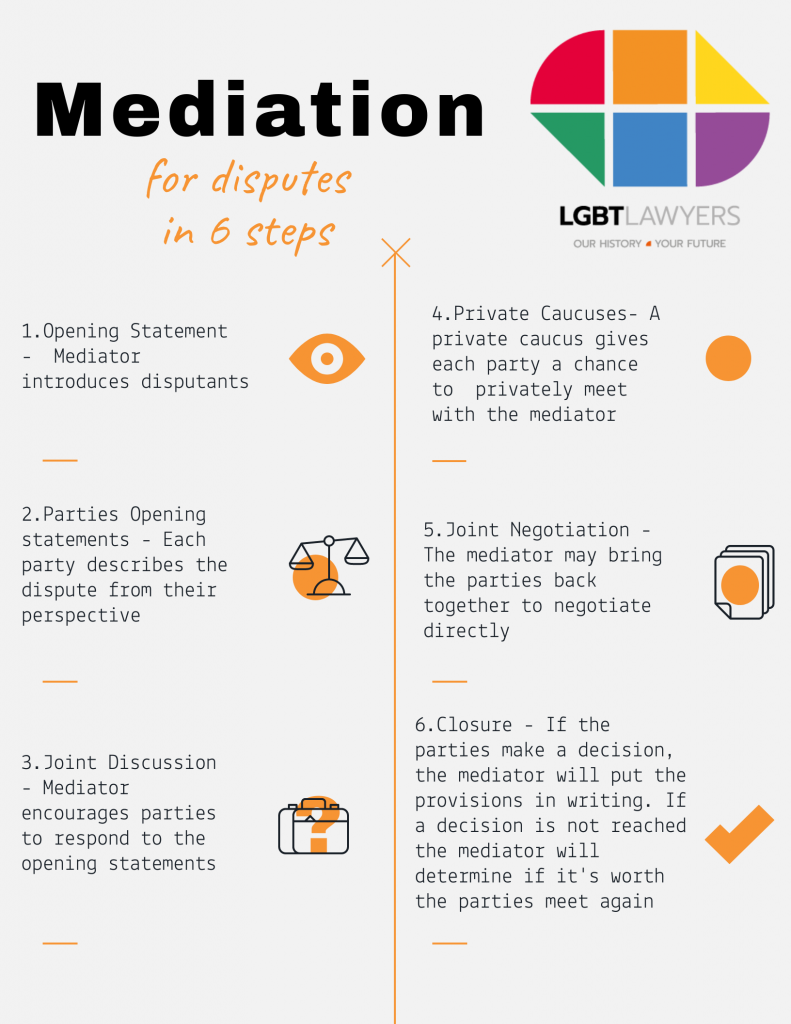Mediation | Read Time 8-10 Minutes.
Disputes are a crucial element of our culture and are a part of the human decision-making process.
The traditional way of resolving these disputes was to settle issues in front of a Judge. However, no one can deny that court is not only expensive but can take a thoroughly long to complete. Mediation is an easier and more efficient way to settle disputes outside of the court.
Mediation uses a strategic process where a neutral third party assists in solving disputes. It’s a modern, cheaper way of sorting out issues to do with relationships, finances, property and child arrangements without forking out for court expenses.

What is mediation?
Mediation is a form of dispute resolution, where two (or more) people will meet with a neutral third person, known as the mediator. The mediator’s job is to assess a situation and see if it can be resolved outside of court. For example, some couples will go to mediation before the divorce process and the mediator will see if it’s the right thing for them. However, if it looks like they do actually need to go to court, the mediator will tell them this.
The mediator is there to help you end a dispute; they will not take sides. They will always help you by discussing anything you are unsure about in the proceedings. Furthermore, mediation is sometimes required by the court to prove that you have attempted to settle before bringing legal action.
How does the process work?
Initial Meeting
When you go to mediation, you will have an initial meeting called an MIAM (Mediation Information and Assessment Meeting). This initial assessment will examine your case and your relationship. If mediation is right for you, your mediator will let you know and will recommend that you continue to attend mediation sessions as opposed to attending court.
Assessing the situation
However, the mediator may say that mediation is not suitable for your case, and will advise that you should follow court proceedings. In this situation, the mediator will present you with a certificate, which you can show to a judge to explain that you have attempted mediation, but it hasn’t worked for you.
The process requires the mediator to evaluate the issues and difficulties between the parties in conflict. Mediation is flexible regarding evidence, formality, and procedure. Throughout the process, the parties involved can stop at any time and refer the dispute to the court.
Outcome
Once a mutual agreement is made between the parties, it can be put into writing. This will prove that mediation has been attempted, and has either been successful or has failed. A key benefit of having a written agreement is that it provides the parties with a reminder of their common ground to prevent future conflict and signifies the ending point of the conflict.
The mutual agreement reached is binding contractually and therefore entails the agreement is enforceable as a contract.
cONFIEDNTIALITY
Confidentiality is key to mediation working as it allows the parties in conflict to resolve their dispute without the scrutiny or judgment of the public. Furthermore, the element of confidentiality is a vital part of mediation. It provides an environment where the parties involved can discuss conflicts without anxiety. Also, the discussion cannot be used as evidence against them later.
What types of mediation are there?
There are various types of mediation which can be used for alternative dispute resolution. These include’:
- Facilitative mediation
- Evaluative mediation
- Narrative mediation
- Transformative mediation
However, the most common types of mediation are facilitative and evaluative.

Facilitative
Facilitative mediation is when the mediator simply tries to resolve problems between two parties. The mediator will use communication and negotiation strategy to come to a long-lasting, mutual agreement. The mediator will ask questions to the parties to try and identify the critical issues in the disagreement.
Facilitative mediation is most suited to relationship situations and can be used if you are finding it challenging to end a civil partnership or are about to go through a divorce. A facilitative mediator does not necessarily find a “solution”. They are there to help the two parties in conflict find a solution by themselves. Also, the mediator does not offer opinions on the parties’ strengths or weaknesses. Furthermore, he does not comment on what would be likely to happen if the dispute were to go court.
Evaluative
Evaluative mediation is based on the trust that the mediator’s knowledge and past experiences can be used to resolve the issues between the parties in conflict. The process involves the mediator evaluating the strengths and weaknesses of the parties and suggesting what the court may decide Furthermore, the mediator also can help by advising parties on how much it would likely cost to resolve through the court. It can be noted, the mediator structures the process and has a direct influence on the outcome reached.
The process of evaluation mediation involved structured meetings between the mediator and one party. The discussions between the mediator and the party are referred to as “caucuses”. They are a vital element of evaluative mediation. The mediator will use their knowledge and understanding to get the parties to comprise, if required, to settle. Finally, the mediator will make a recommendation for settlement for the parties to consider. Above all, the parties in conflict are then able to decide if they want to go ahead with the solution the mediator has offered, or they can reject it.
Evaluation mediation is most suited for disputes which concern business and contract disputes where no comprise has been met after a long period. Finally, evaluative mediation is commonly used in court-mandated mediation whereby the evaluative mediators are often lawyers who have legal experience within the area of the dispute.

Why is mediation normally successful?
Mediation is useful as it provides the parties in conflict a chance to express their fears and interests relevant to the dispute. The mediator is then able to provide solutions based upon the interests of both parties. Moreover, the solutions provided by the mediator are essential as they are specifically tailored to meet the needs of the parties involved. In addition, the mediator combines negotiation and communication tactics to help assist the parties to agree mutually on a solution.
Same-sex divorce mediation is particularly successful and is advised for the LGBT community as divorce, separation and dissolution can be a complicated process when settled in court. Above all, by using mediation, you can avoid expensive court fees and agree mutually on a settlement which is suited to both your needs.
Why might it fail?
1. Poor preparation – Some mediators are incompetent and do not prepare for mediation sufficiently. You must pick the correct mediator as an incompetent mediator may forget to inform you of essential information.
2. Bad Faith – Mediation is an effective way to settle a dispute. However, some individuals refuse to cooperate when mediating. If a person refuses to cooperate, it will be documented by the mediator and later be used as evidence if the dispute goes to court.
3. Lack of communication – Failed mediations can happen due to a lack of communication when people fear the outcome of the process.
How can LGBT Lawyers help?
LGBT Lawyers will put you in connection with a lawyer who will assist you by providing you with extensive knowledge about mediation. Our lawyers are specialised in handling mediation cases specific to the LGBT community. We understand disputes can be stressful for anyone with a sensitive dispute; therefore, we take extra care to ensure you receive the best service possible.
At LGBT Lawyers, we tailor our legal services specifically to the LGBT community and everything that being LGBT entails. Our network of regulated and qualified LGBT Lawyers will ensure your legal requirements are met.
LGBT lawyers provide the LGBT community with access to expert regulated LGBT lawyers across the UK. Our aim at LGBT Lawyers is to ensure LGBT clients receive exceptional service quality. Also, we can connect you with lawyers who offer legal advice which is free from any attitude or judgement.
If you have any questions, or want to discuss a legal matter or don’t know where to start, click here. Alternatively, you can call us on 020 3795 9020 or email us at info@lgbtlawyers.co.uk.




0 Comments